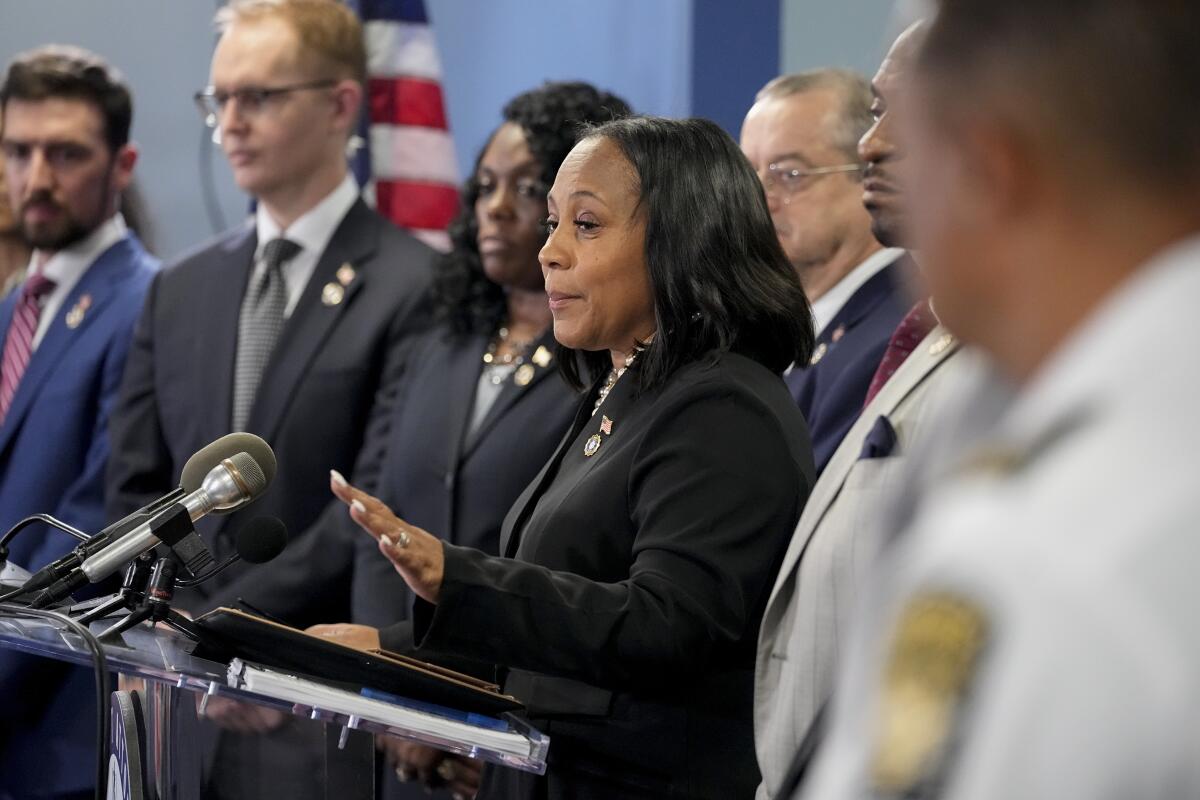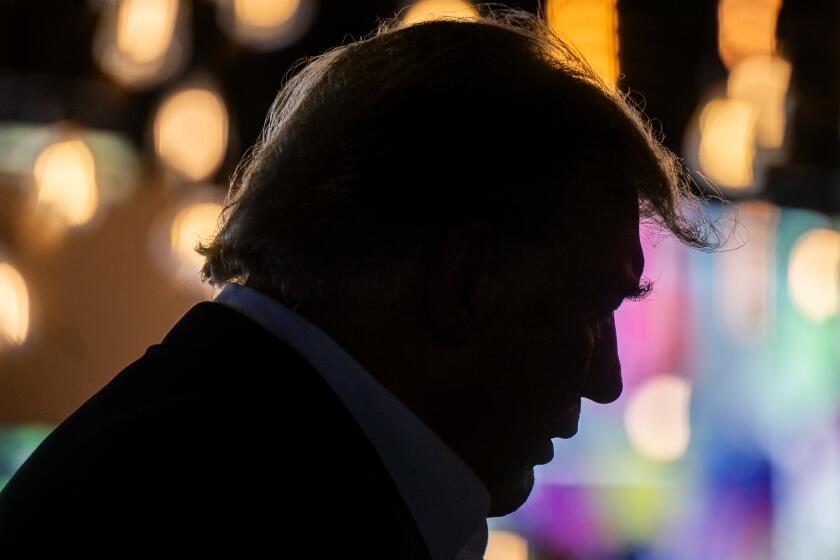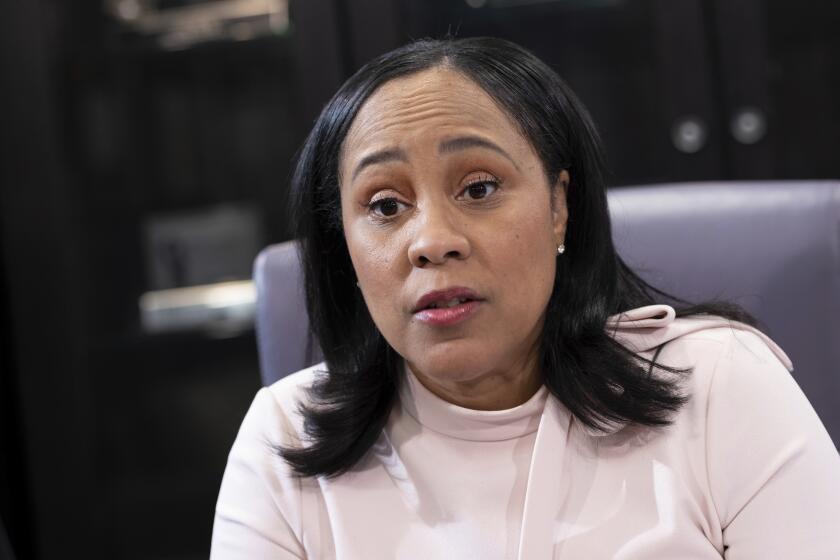How a law associated with mobsters is central to the charges against Trump

- Share via
ATLANTA — Fulton County Dist. Atty. Fani Willis opened her investigation into former President Trump after the release of a recording of a January 2021 phone call between Trump and Georgia’s secretary of state, Brad Raffensperger.
Trump suggested during the call that Raffensperger, a Republican and the state’s top elections official, could help “find” the votes needed to overturn his narrow loss to then-Democratic candidate Joe Biden.
More than two years later, the indictment brought Monday by a grand jury went far beyond that phone call, alleging a web of crimes committed by Trump and others. Willis used Georgia’s Racketeer Influenced and Corrupt Organizations, or RICO, law to charge Trump and 18 associates over their alleged participation in a wide-ranging conspiracy to overturn the state’s 2020 election results.
Willis told reporters late Monday that she intended to try all 19 defendants together and noted her prosecutors’ experience with racketeering cases, saying this was the 11th RICO case brought by her office. Willis became district attorney of Fulton County, which includes Atlanta, in 2021.
Here’s a look at how the law works.
How does a law used against mobsters apply to Trump and his allies?
The federal Racketeer Influenced and Corrupt Organizations Act originated in 1970 as a tool to fight organized crime. The law enabled prosecutors to target people in positions of authority within a criminal organization, not just lower-level people doing the dirty work.
Former President Trump is indicted in Georgia over his efforts to overturn the 2020 presidential election there, his fourth indictment this year.
But its use was never meant to be limited exclusively to organized crime. The Supreme Court noted in a 1989 opinion that the law was drafted “broadly enough to encompass a wide range of criminal activity, taking many different forms and likely to attract a broad array of perpetrators.”
Within a few years of the federal law taking effect, states began passing their own RICO laws. Generally speaking, RICO laws allow prosecutors to charge multiple people who commit separate crimes while working toward a common goal.
What does Georgia’s RICO law say?
Georgia’s RICO Act, adopted in 1980, makes it a crime to participate in, acquire or maintain control of an “enterprise” through a “pattern of racketeering activity” or to conspire to do so. It’s important to note that the alleged scheme does not have to have been successful for a RICO charge to stick.
An “enterprise” can be a single person or a group of associated individuals with a common goal. “Racketeering activity” means to commit, attempt to commit — or to solicit, coerce or intimidate someone else to commit — one of more than three dozen state crimes listed in the law. At least two such acts are required to meet the standard of a “pattern of racketeering activity,” meaning that prosecutors have to prove a person has engaged in two or more related criminal acts as part of their participation in an enterprise to be convicted under RICO.
The U.S. Supreme Court has said that federal RICO allegations must show continuity — that is, a series of related underlying acts over an extended period of time, not just a few weeks or months. But the Georgia Supreme Court has made clear that there is no such requirement in the state law.
Why use the RICO statute?
“I’m a fan of RICO,” Willis said during a news conference in August 2022 as she announced a RICO indictment against more than two dozen alleged gang members.
Willis has said that jurors want to know all the facts behind an alleged crime and that a RICO indictment enables prosecutors to provide a complete picture of all the alleged illegal activity. A narrative introduction allows prosecutors to tell a story that can include a lot of detailed information that might not relate to specific crimes but is relevant to the broader alleged scheme.
The foreperson of the grand jury investigating former President Trump’s actions over his election loss in Georgia gives an account of the proceedings.
RICO charges also carry a heavy potential sentence that can be added on top of the penalty for the underlying acts.
In Georgia, it’s a felony conviction that carries a prison term of five to 20 years; a fine of $25,000 or three times the amount of money gained from the criminal activity, whichever is greater; or both a prison sentence and a fine.
What are the challenges in using the RICO statute?
J. Tom Morgan used the Georgia RICO statute to prosecute a corrupt sheriff when he was the district attorney in DeKalb County, which neighbors Fulton County. He said one challenge is explaining to a jury what the RICO law is and how it works.
“Everybody knows what a murder case is, what a rape case is, what a theft case is. But RICO is not in the everyday vernacular,” he said. “You don’t see a RICO charge on a television show about crime.”
Does Willis have previous experience with RICO cases?
Yes. When she was an assistant district attorney in the Fulton County district attorney’s office, Willis was a lead prosecutor in a RICO case against a group of Atlanta public school educators in a cheating scandal. After a months-long trial, a jury in April 2015 convicted 11 former educators of racketeering for their roles in a scheme to inflate students’ scores on standardized exams.
Since becoming district attorney in January 2021, she has brought several RICO indictments against alleged gang members, including several high-profile rap artists.
Lawyer John Floyd, a nationally known RICO expert in Atlanta, helped Willis with the school cheating case. Soon after opening the investigation into potential illegal meddling in the 2020 election in Georgia, she engaged him to serve as a special assistant district attorney to help with any racketeering cases her office might pursue.
More to Read
Sign up for Essential California
The most important California stories and recommendations in your inbox every morning.
You may occasionally receive promotional content from the Los Angeles Times.












